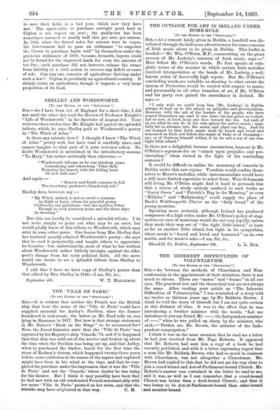THE OUTLOOK FOR ART IN IRELAND UNDER HOME-RULE.
[To THE EDITOR OF THE " SPECTATOR:1
Sra,—At a concert lately given in Dublin, a handbill was dis- tributed through the hall as an advertisement for some concerts of Irish music about to be given, in Dublin. This leaflet is headed—" Mr. Wm. O'Brien, M.P., commenting on the great success of Mr. Ludwig's concerts of Irish music, says :—" Here follow Mr. O'Brien's words. He first speaks in eulo- gistic terms of the manner in which certain Irish melodies received interpretation at the hands of Mr. Ludwig, a well- known artist of deservedly high repute. But Mr. O'Brien's concluding words are valuable, as showing to what extent the system of Protection would be carried with respect to music, and presumably to all other branches of art, if Mr. O'Brien and his party ever gained the ascendancy in Ireland. He says :-
" I only wish we could keep him [Mr. Ludwig] in Dublin always, to lead on to the attack on prejudice and provincialism. However, with the aid of the leaders of the people, who have roused themselves up—and it was time—he has given us a start. Let us now, at least, keep our face toward the foe. Let each of us see what he can do in his own sphere for native music ; man- fully let us advance into the arena and plant our flag. And let our demand be that Irish music shall be heard and loved and honoured on Irish soil before the music of Italy or of Germany-- aye, or of Orpheus himself withal, if he be not a son of our own tight little island."
Is there not a delightful, because unconscious, humour in Mr. O'Brien's eagerness for an " attack upon prejudice and pro- vincialism," when viewed in the light of his concluding sentence P It would be difficult to realise the monotony of concerts in
Dublin under this new regime. Vocalists would confine them- selves to Moore's melodies, while instrumentalists would have a still more limited repertoire to select from. Were Schumann still living, Mr. O'Brien might find it bard to persuade him that a course of study entirely confined to such works as "Garry Owen " and " Patrick's Day in the Morning," or even "ICillaloe " and " Ballyhooley," could supply the place of Bach's Wohltemperite Clavier as the " daily bread" of the young musician.
Speaking more seriously, although Ireland has produced composers of a high order, under Mr. O'Brien's policy of stag- nation our race of musicians would die out very rapidly, unless they made their way out of " the tight little island," at least as far as another little island, less tight in its sympathies, where music is " heard and loved and honoured" on its own merits, and for music's sake.—I am, Sir, &c.,
Shankill, Co. Dublin, September 9th. L.


































 Previous page
Previous page